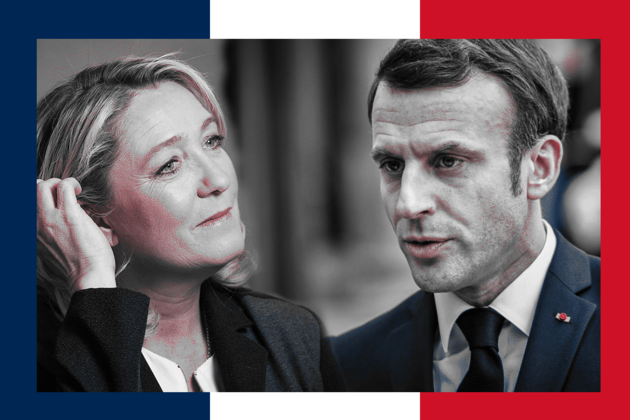French President Emmanuel Macron and far-right challenger Marine Le Pen were due on Friday to make final appeals to undecided voters weighing their fears of what a Le Pen presidency could bring against their anger at Macron’s record. According to the latest surveys for Sunday’s run-off, fear may win the day over loathing: Macron the centrist, pro-European incumbent leads his anti-immigration, eurosceptic challenger by between 10-14 points, well outside margins of error, Reuters writes.
But the fact that nearly three in 10 voters say they will not vote or have not made up their minds means a surprise Le Pen win similar to events such as Brexit and the election of Donald Trump as U.S. president cannot entirely be ruled out.
In recent days, Macron has toned down his often abrasive style with acknowledgments that his attempts at economic and social reform had left many French angry and dissatisfied. “She (Le Pen) has managed to draw on some of what we did not manage to do, on some of the things I did not manage to do to pacify some of the anger,” Macron told France Inter radio on Friday, citing the concerns of low- and middle-income voters about law and order or hits to their livelihoods.
Four separate surveys published on Thursday and Friday after a tense TV debate showed Macron’s score nonetheless either stable or slightly rising to reach between 55.5% and 57.5%.
But they also put the turnout rate at between 72% and 74%, which would be the lowest for a presidential run-off since 1969.
“I will vote (Macron) with no conviction at all, but the France of Marine Le Pen is inconceivable. I don’t want a France that is against diversity,” said Alice Dubois, 28, a journalist from Paris on holiday in Auxerre.
In the TV debate, Macron said a Le Pen presidency would have disastrous consequences. He highlighted her past admiration of Russia’s Vladimir Putin and maintained she still wanted to pull France out of the European Union it helped found.
Le Pen, whose policies include giving French nationals priority on jobs and benefits, and limiting Europe’s rules on cross-border travel, says Macron embodies an elitism that has failed ordinary people. That was evident this week on the streets of the former industrial north of France, a region which includes many Le Pen strongholds and where she has chosen to conclude her campaign. “The working class like us is always at the bottom of the pile,” long-standing Le Pen voter Marcel Bail, 65, told Reuters at a motorway service station in the town of Roye, where Le Pen had lunch on Thursday with truck drivers.
It was the same message on Friday among supporters who turned out to see her in the coastal town of Etaples. “I have 1,300 euros a month, after rent, heating and petrol that’s 400 euros,” 52-year-old gardener Pascal Blondel said. “Since Macron got in, we don’t eat lunch ... Everything costs more.”
Despite a welfare system more generous than most of the world, massive support for French households during the pandemic and fuel bill caps to offset rising energy prices, the cost of living emerged as the top campaign issue of the election. Even if data shows that all but the poorest 5% of households are better off than five years ago, analysts say the fact that purchasing power has stagnated over a decade may have left an entrenched feeling that people cannot get ahead.
This has combined with Macron’s sometimes high-handed leadership style and a perception among many left-leaning voters that he quickly shifted to economically liberal policies soon after being elected to alienate a whole section of the public. “He does not like the French,” Le Pen told Europe 1 radio on Friday, accusing him of disdain towards her and voters in Wednesday’s TV debate and saying he lacked the straightforward common sense she had as a mother of three.






